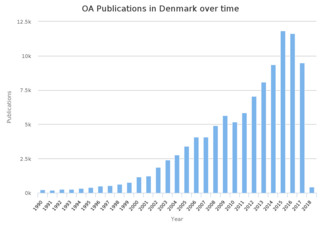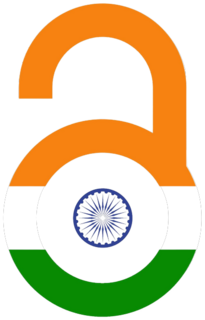Sources
![]() This article incorporates text from a free content work. Licensed under CC-BY-SA IGO 3.0 License statement/permission on Wikimedia Commons . Text taken from Global Open Access Portal , UNESCO. UNESCO.
This article incorporates text from a free content work. Licensed under CC-BY-SA IGO 3.0 License statement/permission on Wikimedia Commons . Text taken from Global Open Access Portal , UNESCO. UNESCO.
Open access to scholarly communication in South Africa occurs online via journals, repositories, and a variety of other tools and platforms. Compared to other African nations, open access in South Africa has grown quickly in recent years.
According to UNESCO, South Africa is a leading African country in terms of open access policies on the governmental level and grass-roots initiatives in universities and research organizations. [1] South African signatories to the international "Open Access 2020" campaign, launched in 2016, include the South African National Library and Information Consortium (SANLiC) and University of the Witwatersrand, Johannesburg. [2] As of January 2018, there are nine research entities with policies in the international Registry of Open Access Repository Mandates and Policies. [3]
As of April 2018, the international Directory of Open Access Journals records some 79 open access journals produced in South Africa. [4]
As of July 2018, the Directory of Open Access Repositories lists 39 repositories in South Africa. This includes 11 traditional universities (or at least their departments), several universities of technology (Cape Peninsula University of Technology, Durban University of Technology, Central University of Technology and Tshwane University of Technology), three comprehensive universities (University of Johannesburg, University of South Africa and University of Zululand) and Council for Scientific and Industrial Research (CSIR). [1] [5]
![]() This article incorporates text from a free content work. Licensed under CC-BY-SA IGO 3.0 License statement/permission on Wikimedia Commons . Text taken from Global Open Access Portal , UNESCO. UNESCO.
This article incorporates text from a free content work. Licensed under CC-BY-SA IGO 3.0 License statement/permission on Wikimedia Commons . Text taken from Global Open Access Portal , UNESCO. UNESCO.
An open-access mandate is a policy adopted by a research institution, research funder, or government which requires or recommends researchers—usually university faculty or research staff and/or research grant recipients—to make their published, peer-reviewed journal articles and conference papers open access (1) by self-archiving their final, peer-reviewed drafts in a freely accessible institutional repository or disciplinary repository or (2) by publishing them in an open-access journal or both.

The Registry of Open Access Repositories (ROAR) is a searchable international database indexing the creation, location and growth of open access institutional repositories and their contents. ROAR was created by EPrints at University of Southampton, UK, in 2003. It began as the Institutional Archives Registry and was renamed Registry of Open Access Repositories in 2006. To date, over 3,000 institutional and cross-institutional repositories have been registered.

University of Cape Town Libraries is the library system of the University of Cape Town (UCT) in Cape Town, South Africa.

In Portugal, the first open access initiatives were carried out by the University of Minho with the creation of RepositóriUM in 2003 and the definition of an institutional policy of self-archiving in 2004. In the following years began SciELO Portugal, for the publication of open access journals, and new repositories in several higher education institutions. The Open Access Scientific Repository of Portugal (RCAAP) launched in 2008.

Open access to scholarly communication in Denmark has grown rapidly since the 1990s. As in other countries in general, open access publishing is less expensive than traditional, paper-based, pre-Internet publishing.

Open access to scholarly communication in Germany has evolved rapidly since the early 2000s. Publishers Beilstein-Institut, Copernicus Publications, De Gruyter, Knowledge Unlatched, Leibniz Institute for Psychology Information, ScienceOpen, Springer Nature, and Universitätsverlag Göttingen belong to the international Open Access Scholarly Publishers Association.

Open access to scholarly communication in Italy has grown since the early 2000s. During an academic conference in Messina in November 2004, Italian universities joined the Berlin Declaration on Open Access to Knowledge in the Sciences and Humanities, in Italy thereafter known as the "Declaration of Messina".

In Belgium, open access to scholarly communication accelerated after 2007 when the University of Liège adopted its first open-access mandate. The "Brussels Declaration" for open access was signed by officials in 2012.

Open access to scholarly communication in Austria has developed in the 2010s largely through government initiatives. The Austrian Science Fund and Universities Austria launched the "Open Access Netzwerk Austria" in 2012 to coordinate country-wide efforts. The "E-Infrastructures Austria" project began in 2014 to develop repositories. The international advocacy effort "OpenscienceASAP – Open Science as a Practice" is based in Austria.
Open access scholarly communication of Norway can be searched via the Norwegian Open Research Archive (NORA). "A national repository consortium, BIBSYS Brage, operates shared electronic publishing system on behalf of 56 institutions." Cappelen Damm Akademisk, Nordic Open Access Scholarly Publishing, University of Tromsø, and Universitetsforlaget belong to the Open Access Scholarly Publishers Association. Norwegian signatories to the international "Open Access 2020" campaign, launched in 2016, include CRIStin, Norsk institutt for bioøkonomi, Norwegian Institute of Palaeography and Historical Philology, Norwegian University of Science and Technology, Oslo and Akershus University College of Applied Sciences, University of Tromsø, University of Bergen, University of Oslo, and Wikimedia Norge.
Open access to scholarly communication in Sweden is relatively widespread. In 2010 the Swedish Research Council began requiring its grantees to make research results available in open access form. Lund University Libraries and Stockholm University Press belong to the international Open Access Scholarly Publishers Association.
Open access scholarly communication of Ireland can be found by searching "RIAN," a national portal maintained by the Irish Universities Association.
In January 2008, Russian, Belarusian, and Ukrainian academics issued the "Belgorod Declaration" in support of open access to scientific and cultural knowledge. Russian supporters of the international "Open Access 2020" campaign, launched in 2016, include Belgorod State University, National Electronic Information Consortium (NEICON), and Webpublishers Association.
In Ukraine, a 2007 law requires open access publishing of research created through public funding. In January 2008, Ukrainian, Belarusian, and Russian academics issued the "Belgorod Declaration on open access to scientific knowledge and cultural heritage." Ukrainian academics issued another statement in June 2009 in support of open access.

Open access scholarly communication of Greece is preserved in repositories maintained by several academic institutions.
Open access to scholarly communication in Hungary has developed in recent years through digital repositories and academic publishers, among other means. In 2008 several academic libraries founded the Hungarian Open Access Repositories (HUNOR) consortium.

In India, open access to scholarly communication has been developing for several decades. During May 2004, two workshops were organised by the M S Swaminathan Research Foundation, Chennai which laid the foundation for the Open Access movement in India. In 2009, the Council of Scientific & Industrial Research began requiring that its grantees provide open access to funded research. The "Delhi Declaration on Open Access" in South Asia was issued on 14 February 2018, signed by dozens of academics and supporters. The members of the community of practice, Open Access India had adapted the PLOS's Open Access logo and modified it to represent it as the Open Access movement in India and had formulated a draft policy on Open Access for India.
In Canada the Institutes of Health Research effected a policy of open access in 2008, which in 2015 expanded to include the Natural Sciences and Engineering Research Council and Social Sciences and Humanities Research Council. The Public Knowledge Project began in 1998 at University of British Columbia. Notable Canadian advocates for open access include Leslie Chan, Jean-Claude Guédon, Stevan Harnad, Heather Morrison, and John Willinsky.
Open access (OA) to academic publications has seen extensive growth in Australia since the first open access university repository was established in 2001 and OA is a fundamental part of the scholarly publishing and research landscape in Australia. There are open access policies at the two major research funders: The National Health and Medical Research Council (NHMRC) and Australian Research Council (ARC) and around half of Australian Universities have an OA policy or statement. Open Access Australasia, the Council of Australian University Librarians (CAUL), and the Australian Library and Information Association (ALIA) are advocates for Open Access and related issues in Australia.
Searchable full-text journal database
News and comment from the worldwide movement for open access to research